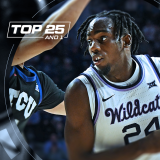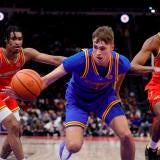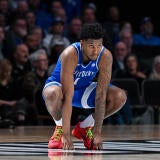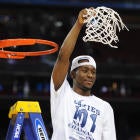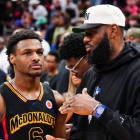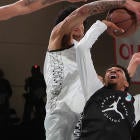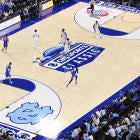Kansas shared the Big 12's regular-season title in 2005, 2006, 2008 and 2013, and the Jayhawks won the league outright in eight of the other past 12 years. Add it up, and that's 12 straight Big 12 championships for Bill Self. One more and Kansas will tie UCLA's record of 13 consecutive conference titles.
And, yes, KU is going to do it.
Simply put, the Jayhawks are way better on paper than anybody else in the league. That's why Kansas is ranked second in the preseason Coaches poll while no other Big 12 team is in the top 20. Kansas is also third in KenPom's preseason rankings, and the first Associated Press poll; no fellow league member is in the top 15. So the prediction here is this: not only will the Jayhawks win a 13th straight Big 12 regular-season championship, they'll win it by two or three games, at least. Then they'll earn a top-two seed in the NCAA Tournament for the eighth consecutive season and have a good shot to make the third Final Four of Self's career.
(Below you'll find everything you need to know about the Big 12 -- including our predictions for Big 12 Player of the Year, Freshman of the Year and Coach of the Year, all-conference teams, as well as our predicted order of finish and a scouting report including strengths and weaknesses, X-factors and a projected regular-season win total for each team.)
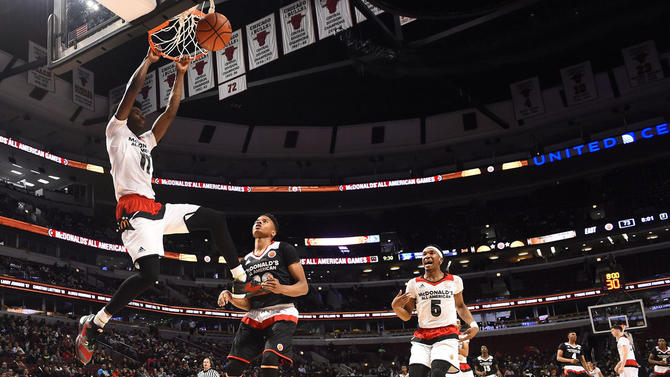
Player of the Year
Josh Jackson, Kansas
The safe pick might be Iowa State's Monte Morris. Or even one of Kansas' veteran guards -- either Devonte' Graham or Frank Mason. But we're still going with Jackson. He was the top-ranked prospect in the Class of 2016, according to 247Sports. And, it's worth noting, the last top-ranked prospect to enroll at Kansas was a young man named Andrew Wiggins, who averaged 17.1 points and 5.9 rebounds in his lone season of college basketball. Wiggins then became the No. 1 overall pick of the 2014 NBA Draft and subsequently earned NBA Rookie of the Year honors. So don't be surprised if Jackson is something similar.
Freshman of the Year
Josh Jackson, Kansas
Obviously, any time a Player of the Year is a freshman he also has to be the Freshman of the Year. It wouldn't make sense otherwise. So here we are. Jackson has already won three gold medals while representing USA Basketball. He averaged 26.9 points, 13.1 rebounds and 6.3 assists for Prolific Prep in California as a high school senior and was named a McDonald's All-American. Jackson scored 14 points in KU's first exhibition.
Coach of the Year
Bill Self, Kansas
With all due respect to Tubby Smith, it was ridiculous that Self didn't take Big 12 Coach of the Year honors last season when he won what KenPom described as the nation's top-rated conference by multiple games. Even more ridiculous is the fact that Self only has four Big 12 Coach of the Year awards to go with his 12 straight Big 12 regular-season titles. Something doesn't add up there. It's like Self is penalized for consistently being great. But surely the voters will wise up this season, right?
All-Conference
G: Monte Morris | Iowa State | Senior
G: Jawun Evans | Oklahoma State | Sophomore
F: Josh Jackson | Kansas | Freshman
F: Johnathan Motley | Baylor | Junior
F: Jarrett Allen | Texas | Freshman
Predicted order of finish
Scouting reports
(Teams listed in consensus predicted order of finish)
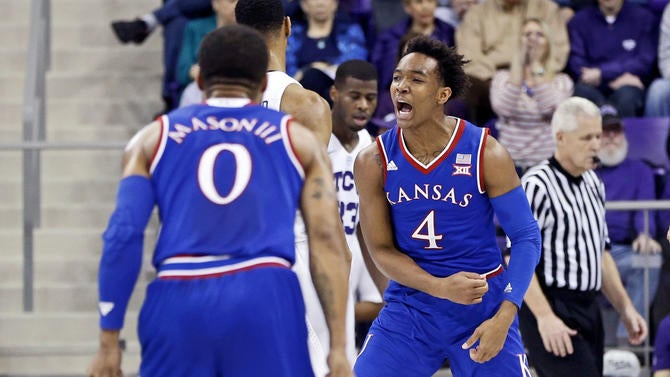
 1. Kansas Jayhawks
1. Kansas Jayhawks
Strength: Experienced guards
Neither Frank Mason nor Devonte' Graham were heralded prospects coming out of high school, but they've developed, together, into one of the nation's best backcourts. Mason averaged 12.9 points and 4.6 assists last season while Graham averaged 11.3 points and 3.7 assists. The duo provides Bill Self with a pair of experienced and accomplished guards who should lead the Jayhawks to a 13th consecutive Big 12 title.
Weakness: Unknown up front
Kansas' problems, to be clear, are smaller than almost everybody else's problems. But, that said, it is true that the Jayhawks don't return a single frontcourt player who has ever averaged at least six points or 19 minutes per game. So one or two somebodies, at least, need to emerge as reliable frontcourt players -- whether that's Landen Lucas, Carlton Bragg, Ole Miss transfer Dwight Coleby, freshman Udoka Azbuike or whomever.
X-Factor: Jackson's development
People don't normally nitpick Bill Self. But when they do it's sometimes about how his five-star freshmen don't always have a major impact immediately. Which brings me to Josh Jackson. Whether he becomes a great college player, as opposed to just an intriguing NBA prospect, could be what determines if Self makes the third Final Four of his career and wins a second national championship.
Projected regular-season win total: 27
The Jayhawks' non-league schedule features a neutral-site game against Indiana, a neutral-site game against Duke, and a road game at Kentucky. They could go 3-0 in those games. Or 0-3. Or anything in between. Here's my guess: KU will go 1-2 against Indiana, Duke and Kentucky but still finish the regular season 27-4 after rolling through the Big 12. And that would be plenty good enough to secure a No. 1 seed in the NCAA Tournament.
 2. Texas Longhorns
2. Texas Longhorns
Strength: Talented frontcourt
Texas added two heralded bigs to the roster from the Class of 2016 -- namely Jarrett Allen and James Banks. Both are top-shelf athletes with USA Basketball experience who are perfect for Shaka Smart's up-tempo style. Then there's Shaquille Cleare, who provides bulk around the rim. So the Longhorns should be strong in the frontcourt despite the loss of Cameron Ridley and the 11.1 points and 8.5 rebounds he averaged last season.
Weakness: Questions at point guard
The Longhorns lost their top two point guards from last season and now do not have a proven and natural one on the roster. Kerwin Roach will likely start -- but he's more of a combo guard than a point guard. So it'll be interesting to see if the 6-3 sophomore can successfully adjust to being the primary ball-handler for a Top 25 team. For what it's worth, I'd bet on Roach being fine, if not excellent. But it is a question mark heading into the season.
X-Factor: Kerwin Roach
Roach is an obvious X-factor because he's going to be asked to do something -- i.e., run a team -- he's never done at the Division I level. If the terrific athlete and highlight-reel dunker flourishes in that role, the Longhorns might be Kansas' biggest threat in the Big 12. If not, Shaka Smart will spend the season missing Isaiah Taylor way more than he'd like to.
Projected regular-season win total: 23
I'm higher on Texas than many, if not most. So note that. But I have the Longhorns going 11-2 in the non-league portion of their schedule and 12-6 in the Big 12. That would give them 23 regular-season wins and a bid to the the NCAA Tournament, which would double as Shaka Smart's seventh consecutive appearance in the Big Dance.
 3. Iowa State Cyclones
3. Iowa State Cyclones
Strength: Great and steady point guard play
There is nothing more important in college basketball than having a great point guard, and Iowa State has one thanks to Monte Morris' decision to return for his senior year. He averaged 13.8 points and 6.9 assists last season and has, for the past two years, had one of the best assist-to-turnover ratios in the country. There's a reason Morris averaged 38.0 minutes per game as a junior. He's terrific and the main reason why the Cyclones should be able to endure the loss of Georges Niang, Abdel Nader and Jameel McKay.
Weakness: Defense
The Cyclones have finished ranked in the top 30 at KenPom each of the past five seasons but have never had a top-50 defense, which is among the reasons they haven't advanced past the Sweet 16 since 2000. It's probably not a coincidence that the teams that have eliminated Iowa State from four of the past five NCAA Tournaments all ranked in the top 10 in defensive efficiency while the Cyclones' best defensive ranking in any of those seasons was 55th. Bottom line, at some point in a single-elimination tournament featuring the other top teams in the country, you have to be able to stop somebody.
X-Factor: Graduate transfers
Graduate transfers can be hit-or-miss. But the Cyclones really need their two graduate transfers -- Merrill Holden and Darrell Bowie -- to help ease the loss of multiple key players. Holden, a 6-8 forward, averaged 8.1 points and 5.0 rebounds last season at Louisiana Tech. Bowie, also a 6-8 forward, averaged 9.8 points and 5.4 rebounds two seasons ago at Northern Illinois but missed last season while recovering from shoulder surgery. So he hasn't played in a real game since March 2015.
Projected regular-season win total: 21
Iowa State won 21 games last regular season and only lost twice at home. Something similar seems likely this season, if only because I don't believe the Big 12 will be as difficult to navigate. The Cyclones finished tied for fifth in the league last March, and I think they'll finish even higher this season even if they're not necessarily a better team. So I'll set the regular-season win total at 21, which would position Iowa State for a sixth straight trip to the NCAA Tournament.
 4. West Virginia Mountaineers
4. West Virginia Mountaineers
Strength: Press Virginia
The disruptive press that Bob Huggins has committed to using in recent years should again be a headache for the rest of the Big 12. West Virginia forced opponents into turnovers on basically one out of every four possessions last season. And the Mountaineers return four players who started at least 16 games. So count on "Press Virginia" again delivering way more wins than losses, same as it has the past two years.
Weakness: Rebounders needed
West Virginia is without Devin Williams and Jonathon Holton, who combined to grab 567 rebounds -- or 17.1 boards per game -- last season; no returning WVU player has ever averaged more than 3.1 rebounds per game. So exactly which players are going to help West Virginia prevent opponents from getting easy second looks is a question heading into this season.
X-Factor: Esa Ahmad
Esa Ahmad was a top-50 recruit out of high school who started 34 games last season. But he only averaged 4.9 points and 2.7 rebounds in 18.1 minutes per game. With Jonathan Holton and Devin Williams gone, West Virginia needs at least one frontcourt player to break through. Perhaps Ahmad, a two-time player of the year in the state of Ohio, can be that guy.
Projected regular-season win total: 24
I don't see more than one non-league loss -- at Virginia in early December -- on West Virginia's schedule, which suggests the Mountaineers should start well. And I think they'll finish no worse than fourth in the Big 12 with a 12-6 league mark. So I'll put Bob Huggins down for 24 regular-season wins, same as he had last season, meaning the Mountaineers should be in the NCAA Tournament for the third straight year.
 5. Baylor Bears
5. Baylor Bears
Strength: Backcourt
Baylor lost its starting point guard (Lester Medford) who averaged 6.5 assists per game, but the Bears might actually be better in the backcourt thanks to the addition of Miami transfer Manu Lecomte. The 5-11 point guard sat out last season per normal NCAA transfer rules after averaging 7.9 points in 22.4 minutes per game as a sophomore for the Hurricanes. More impressively, Lecomte shot 45.6 percent from 3-point range. So he and junior guard Al Freeman should combine to create an interesting tandem considering Freeman made 50 3-pointers last season.
Weakness: Big men
The Bears lost their top two rebounders from last season -- namely Taurean Prince and Rico Gathers. So while they do have some interesting pieces at the forward positions, it's hard to imagine those pieces producing more than the 27.1 points and 15.1 rebounds Prince and Gathers produced while leading Baylor to 22 wins and the NCAA Tournament. Can Jonathan Motley and Ishmail Wainright elevate their games? Can JUCO transfer Jo Lual-Acuil have an impact? If so, Baylor should be fine. If not, the Bears might struggle.
X-Factor: Jonathan Motley's consistency
Jonathan Motley averaged 11.1 points and 5.1 rebounds in 20.9 minutes per game last season but was wildly inconsistent. The 6-10 forward eclipsed the 20-point barrier seven times but failed to score at least five points in eight different games. Truth is, Baylor didn't have to rely on Motley last season because it had Taurean Prince and Rico Gathers. But Motley will have a bigger role now that those two are gone, and how he handles it could determine whether the Bears make or miss the NCAA Tournament.
Projected regular-season win total: 19
Baylor has a tough non-league schedule featuring games against Oregon, VCU, Xavier and Ole Miss -- plus possible games in the Battle 4 Atlantis against Michigan State and either Louisville or Wichita State. So something like 19-12 in the regular season feels right. And that would probably be enough to place the Bears in a decent spot to earn an at-large bid to the NCAA Tournament.
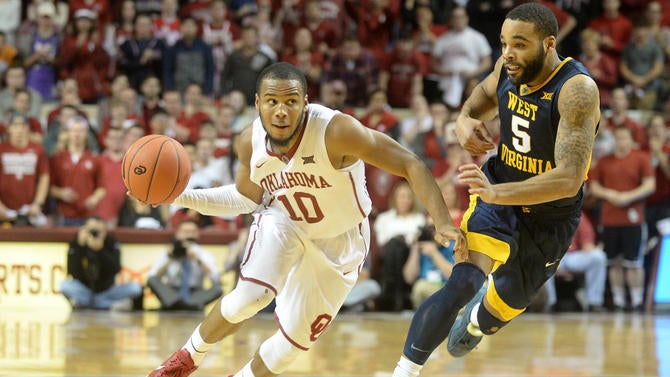
 6. Oklahoma Sooners
6. Oklahoma Sooners
Strength: Sooners are still stoppers
Everybody remembers Buddy Hield, all of those jumpers and last season's Oklahoma team that could explode offensively. But the Sooners were good defensively, too. They've been top 20 in defensive efficiency in each of the past two seasons. And that's the type of thing Oklahoma should be able to maintain despite the losses of Hield, Isaiah Cousins and Ryan Spangler.
Weakness: Hield's gone
It's not a weakness as much as it's just a reality. But how do you replace a two-time Big 12 Player of the Year and National Player of the Year? Throughout recent history, with few exceptions, teams take a step back the season immediately after they lose a National Player of the Year. And Oklahoma is unlikely to buck that trend because there's nobody on the roster who can provide anything close to what Buddy Hield provided the past two years.
X-Factor: Christian James
Christian James only averaged 3.0 points last season. But he got 13 in the Big 12 Tournament vs. West Virginia and 12 in the Sweet 16 against Texas A&M. So there's some ability there. And if the 6-4 guard can tap into it more regularly, in a presumed bigger role, it would go a long way toward easing the loss of Buddy Hield.
Projected regular-season win total: 20
The Sooners could get Xavier in the Tire Pros Invitational -- and will get Wisconsin at the Kohl Center and Wichita State in Oklahoma City, which is why it's hard to imagine them winning more than nine or 10 non-league games. Either way, something like 10-8 seems about right in the Big 12. So I'll project 20 regular-season victories for Oklahoma, which would be respectable for a program in a league like this that lost three starters.
 7. Oklahoma State Sooners
7. Oklahoma State Sooners
Strength: Brad Underwood is top notch
Oklahoma State made one of the offseason's best hires, if not the best hire, when it aggressively pursued and landed Brad Underwood. The 52 year old went 89-14 in three seasons at Stephen F. Austin and made the NCAA Tournament all three years. So Oklahoma State's strength is, quite simply, hope. It's the hope that a quality coach with a proven track record of winning provides.
Weakness: Rebounding
The Cowboys ranked 200th in offensive rebounding percentage and 294th in defensive rebounding percentage last season. And they only have two returning players taller than 6-7 -- namely Leyton Hammonds and Mitchell Solomon. So Brad Underwood is terrific, clearly. But is he really going to be able to fix that in his first year at OSU?
X-Factor: Phil Forte
Phil Forte is an accomplished college player. But he only played three games last season because of an elbow injury, and it's unclear how he'll look coming back from that. But if he's good, Brad Underwood's transition from Stephen F. Austin to Oklahoma State will be smoother than it would otherwise be.
Projected regular-season win total: 17
Oklahoma State could theoretically get Connecticut, North Carolina and Oregon in the Maui Invitational, which is terrifying. And the Cowboys also have games at Wichita State and Maryland. So the non-league schedule is tough. And the guess here is that Oklahoma State goes 9-4 in that portion of its schedule, then 8-10 in the Big 12 and finishes with 17 regular-season victories in Brad Underwood's first season in Stillwater.
 8. Texas Tech Red Raiders
8. Texas Tech Red Raiders
Strength: Experienced roster
The Red Raiders lost their head coach (Tubby Smith) but returned four players who started at least 15 games for last season's team that made the NCAA Tournament -- most notably Zach Smith, a 6-8 forward who averaged 10.0 points and 7.3 rebounds as a sophomore. In other words, Texas Tech has a roster filled with experienced guys who have produced and won in the Big 12. And it's a huge advantage any time players are merely trying to do something they've already done before.
Weakness: Too many turnovers
Keenan Evans is a veteran point guard who guided Texas Tech to 19 wins last season. But he also had a lousy assist-to-turnover ratio, and the Red Raiders, as a team, turned the ball over on 17.8 percent of their possessions. It would be wise to fix that. Or, at least, improve it.
X-Factor: Niem Stevenson
JUCO prospects in this era often don't make huge impacts on quality teams. But there's reason to be excited about Niem Stevenson, a 6-5 guard who averaged 24.7 points, 6.9 rebounds, 2.2 assists and 1.6 steals last season at Seward County (Kan.) Community College. If he transitions well to Texas Tech, and helps ease the loss of Toddrick Gotcher and Devaugntah Williams, the Red Raiders could be back in the NCAA Tournament.
Projected regular-season win total: 19
An 11-2 record in the non-league portion of the schedule seems attainable as long as the Red Raiders just avoid bad upsets. And something like 8-10 in the Big 12 feels close to right. So I'll put the Red Raiders at 19 regular-season wins, which is exactly what they had last season. And hat kind of record, combined with a win or two in the Big 12 Tournament, would be enough to make a case for another NCAA Tournament appearance.
 9. Kansas State Wildcats
9. Kansas State Wildcats
Strength: Experience all over the court
The Wildcats return five players who started at least 11 games, and averaged more than 20 minutes per contest, last season. So they're experienced at all five positions. The best of the bunch is Wesley Iwundu -- a 6-7 forward who averaged 11.9 points, 4.5 rebounds and 3.7 assists while earning all-league honors. If he's good on the wing, and Barry Brown and Dean Wade improve on their nice freshmen seasons, KSU might be able to avoid the ninth-place finish the Big 12's coaches have predicted for them.
Weakness: Talent, or lack thereof
The issue for KSU is that its experienced players are mostly unheralded recruits -- proof being that not a single one was ranked in the top 125 of his high school class, according to 247Sports. In fact, Bruce Weber's past four recruiting classes have ranked eighth (2013), fifth (2014), ninth (2015) and ninth (2015). And in a league like the Big 12, that eventually catches up with you. Such is the main reason why Kansas State is 13-23 in the Big 12 the past two years and projected to finish near the bottom of the league again this season.
X-Factor: Kamau Stokes
Kamau Stokes played 21 games last season, started 20, and Kansas State was 13-8 in those games. Then he suffered a season-ending knee injury against Ole Miss, and the Wildcats went 4-8 without him. It's hard to say how much of the disparity between KSU's record with and without Stokes had to do with him as opposed to just how the schedule unfolded. But, either way, Kansas State was undeniably better with him. So now the Wildcats need the sophomore to return from that injury as an even better version of what he showed.
Projected regular-season win total: 15
The Wildcats have been picked ninth in the Big 12, and the ninth-place team usually wins about four or five league games. So even with a non-league schedule that should be mostly simple, it's still doubtful that Kansas State finishes above .500. My prediction is that KSU wins 15 games in the regular season and misses the NCAA Tournament for the third straight year, which could be dangerous for its on-the-hot-seat coach.
 10. TCU Horned Frogs
10. TCU Horned Frogs
Strength: Loaded with guards
Jamie Dixon's decision to hire former UNLV assistant Ryan Miller led to the school enrolling Jaylen Fisher -- a four-star recruit who is the highest-rated prospect TCU has landed since 2003. And the Horned Frogs also have Malique Trent, a 6-2 guard who averaged 11.6 points last season while leading the Big 12 in steals. Meantime, Texas A&M transfer Alex Robinson, a 6-1 guard, is now eligible. And Brandon Parrish, a 6-6 guard who shot 41.5 percent from 3-point range last season, is back. So TCU has some interesting pieces in what is an oddly crowded backcourt.
Weakness: Interior shooting
TCU was terrible inside the arc last season, shooting just 43.7 percent on 2-pointers. That ranked 335th nationally, and the Horned Frogs did not add an interior piece capable of making an immediate impact. So unless first-year coach Jamie Dixon is a miracle worker, odds are TCU will struggle again inside the arc and thus fail to consistently score enough points to beat quality opponents.
X-Factor: Karviar Shepherd
Karviar Shepherd was a consensus top-75 recruit out of high school and considered a huge coup for what was, at the time, Trent Johnson's program. But his minutes per game, points per game and rebounds per game have decreased every season. Obviously, that's not good. So it would be great if the 6-11 forward produced a terrific senior season that makes Dixon's transition from Pitt to TCU go better than most seem to think it's going to go.
Projected regular-season win total: 14
One way or another, I won't be shocked if Jamie Dixon avoids a last-place finish in the Big 12 -- even though that's what most are predicting for his program. But about 14 regular-season victories still appears to be all that can reasonably be expected in the first season of a rebuilding project.


















